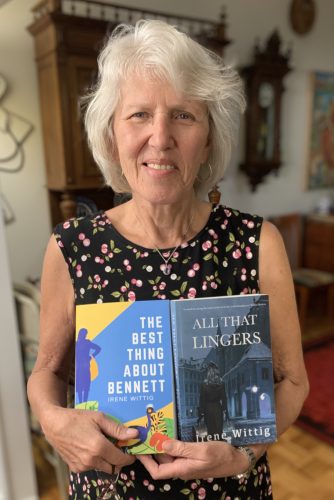
About Irene Wittig:
I was born in Rome and my early childhood was spent changing countries and languages until we arrived in New York. There, from age seven, I lived in a Manhattan neighborhood of Holocaust survivors and fellow Europeans displaced by war. I absorbed their memories of betrayals and sacrifice, of courage and difficult decisions, of strangers’ kindnesses and sheer luck. I came to understand that their gratitude for having found safety in America was tinged with longing for the lives they’d once loved and had been forced to give up. I learned that the past is never quite past.
I studied art at the High School of Music and Art, a languages at City College. After a Fulbright year in Germany, I attended the University of Maryland grad school and then worked for the Navy Dept in civilian personnel. A friend and I took a passenger cargo ship to Italy and I ended up staying in Naples for almost five years. I came back to the U.S. married and with a baby daughter. A son followed soon after. Twenty years later, my husband and I lived in Switzerland for six years. We now live in Arlington, Virginia. We love to travel.
What inspires you to write?
Reading good writing is my best inspiration. Themes, topics, plots and characters can be inspired by one's own experiences, dreams, fears and hopes; and by events around them whether momentous, like war, or small, such as items found on a back page of a newspaper. My family's memories and experiences during World War II lie at the core of my novel ALL THAT LINGERS and even crept into one of the characters in THE BEST THING ABOUT BENNETT.
What authors do you read when you aren’t writing?
I have been reading for so many years that my favorites have changed many times. What fills your needs when you are 14 or 30 can be quite different than what you need or love when you 60. I was always very loyal to my favorites and read as many of their books as possible. Some of my favorites over the years have been Dickens, A.J. Cronin, Erich Maria Remarque, Dostoevski, Salinger, Nevil Shute, Kurt Vonnegut, Margaret Drabble, Tolkien, Penelope Lively, Ann Tyler, Kate Atkinson, Doris Kearns Goodwin. The list is very long and covers writers of great depth like Dostoevski and fun mysteries like Agatha Christie (I've read all of hers, including her three novels under a pen name).
Tell us about your writing process.
I start with characters I care about and want my readers to care about. I don't outline because I find that knowing the whole story ahead of time is too restricting. What if my characters want or need to go in a different direction. I write myself lots of notes on character, which often involves thinking up new situations they might find themselves in.I also revise a lot as I write. When I find that I want to make major changes, I save the first draft and start a second. Or third or fourth or… This allows me to look back, and to make sure that I am being consistent. As I write I also continue researching things such as historical or current events, or other aspects that become part of the story.
For Fiction Writers: Do you listen (or talk to) to your characters?
I don't talk to my characters but I try to put myself in their heads to feel and think what they would feel and think in their circumstances.
What advice would you give other writers?
Write what you would like to read. Write characters you care about so that you readers will care about them too. Don't be afraid to try new things, or to change what you've already written.
How did you decide how to publish your books?
Age was a factor in my case. I wanted to see my work in print and was afraid waiting to find an agent who had to wait to find an editor who had to wait and so on. So I decided to self-publish and that has been an interesting journey on its own. Research before you make your decision. Be careful not be pulled into someone else's money-making schemes. Ask when you don't know.
What do you think about the future of book publishing?
I think self-publishing will be more and more common unless traditional publishers make changes that are beneficial to writers.
What genres do you write?: I have written/published a how-to book on ceramics, an historical novel, a novel that is best described as women's fiction, a book of short stories, and I have illustrated and written an alphabet book for children.
What formats are your books in?: eBook, Print, Both eBook and Print, Audiobook
Website(s)
Irene Wittig Home Page Link
Link To Irene Wittig Page On Amazon
Your Social Media Links
Goodreads
Facebook
Twitter
Pinterest
LinkedIn
Instagram
All information in this post is presented “as is” supplied by the author. We don’t edit to allow you the reader to hear the author in their own voice.
